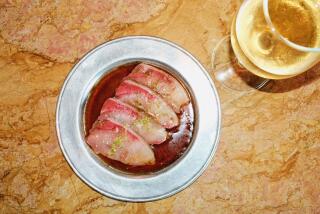Passions flame over kebabs
Around Glendale, restaurateur Vrej Sarkissian is known as one of the kings of kebab.
There’s little pretense about his seasoning -- a little salt, pepper, chopped onions and extra virgin olive oil. But Sarkissian says his skewers stand out the moment they meet the smoky charcoal grill he set up outside his busy establishment.
He lets his chicken, beef and pork sit about 15 minutes on thick steel grates, two inches above a bed of smoldering mesquite-flavored charcoal. The dense smoke and flame-ups coat the meat with a char and flavor he never achieved indoors with a gas grill, he said.
“People can always tell the difference,” said Sarkissian, owner of Anoush Banquets & Catering. “They want the original flavor of home.”
But in his quest for the perfect kebab, Sarkissian and other Armenian chefs have become unwitting outlaws.
That’s because Glendale, a city with the largest Armenian population in the United States, doesn’t allow restaurants to grill food outdoors. Instead, chefs are told to cook their meats indoors on kitchen gas grills -- something serious kebab cookers like Sarkissian loathe.
In recent weeks, the question of outdoor grilling has become a divisive political issue in Glendale. The city, which is 40% Armenian, elected an Armenian majority -- three out of the five members -- to the City Council last year, and part of their agenda was to allow restaurants to grill outdoors. But they have been unable so far to win the four votes needed for passage -- something some Armenians consider a slap at their culture.
“This is the epicenter for fine Armenian cuisine,” said a frustrated Councilman Ara Najarian, who believes that the grilling rules are stymieing the development of Glendale’s dining scene.
“Most Armenians are highly sophisticated, and they demand the best. A second-rate restaurant would not make it in Glendale,” he said. “It’s developed into a gourmet war between these folks. I once saw a place serve a flaming rack of lamb.”
While the city has struggled to strictly enforce the ban on outdoor grilling, Najarian and other backers of the rule change say it would bring outdoor kebab grilling out of the shadows and send a message that the city supports the pursuit of Armenian cuisine.
Mayor Dave Weaver, who opposes lifting the ban, believes that the debate has gotten too bitter and denounced his Armenian American colleagues on the council for “using the race card.”
“We’re portrayed as anti-Armenian, and that’s so far off the mark,” he said. “We got a lot of complaints saying, ‘Why are you allowing them to grill outdoors?’ I’m philosophically opposed to commercial grilling outside. If we open the door, then anybody from Bob’s Big Boy to a barbecue place can do it.”
The city’s ordinance prohibits all outdoor commercial activity without a special permit -- and officials have concluded that outdoor grills fall under the rules. The city has received complaints from residents about the smoke from food being grilled outside banquet halls.
“Would you like to smell other peoples’ food all day long?” asked longtime resident Nancy Campbell. “We were all OK stopping smoking in a lot of public places.”
Glendale is home to 85,000 Armenian Americans. The surge in immigration began in the 1970s and has fundamentally altered the city.
Evidence of the Armenian influence is everywhere, including on storefront signs in Armenian that dot the streetscape.
The demographic shift has not always been smooth. There have been tensions at local high schools between Latino and Armenian students. The Armenian community itself has evolved into a diverse group, with some in wealthy neighborhoods in the hills and poorer immigrants struggling in south Glendale.
As in many cultures, the common denominator is food.
Armenian restaurants have popped up all over town, but the most prominent are the sprawling upscale banquet halls that are fully booked every weekend for weddings, birthdays and graduations. Patronage is not restricted to Armenians.
The Armenian-owned Renaissance Restaurant, a behemoth business on Central Avenue that brings to mind the architecture of the Bellagio hotel and casino in Las Vegas, is equipped to serve Mexican and Filipino food if desired.
But the one thing Renaissance doesn’t have that Sarkissian’s Anoush does is an outdoor grill.
Sarkissian is one of what officials believe are numerous restaurateurs who secretly grill their meats on charcoal outdoors, defying city codes.
The flavors the coals create is reminiscent of the “old country” and brings the experience together, Sarkissian said.
“I think, with each bite into the mesquite-grilled food, you feel a little bit of home,” said Sacco Sarkissian, Vrej’s younger brother. “People bring their families here for special occasions. They celebrate and eat this food together
“It’s what our culture is about. It’s great, because they’re able to hold onto their heritage. They haven’t been forced to Americanize.”
With such a large Armenian diaspora across the globe, that means serving food with influences from Iran, Turkey, Lebanon and the former Soviet Union.
Sarkissian said the menu at his two Anoush restaurants reflects all these tastes.
Aside from the typical kebabs such as pork, chicken and beef, there’s a chicken Kiev and pickled herring, a clear nod to Russia. There’s also a wildly popular appetizer called eggplant caviar, a relish of grilled eggplant and sweet, roasted red bell peppers that diners can scoop with flat bread.
Those who want to lift the outdoor grill ban hoped the issue would result in a better understanding of Armenian cuisine. Now, they worry that it might actually mean fewer restaurant grills with charcoal.
“Not that it’s bad, but I think we all know that burgers on the grill taste better than on the frying pan,” Najarian said.
Sarkissian isn’t giving in. He said he is already making plans to move his grill -- a heavy, steel rectangle set in his restaurant’s parking lot -- indoors. He estimates it will cost him about $80,000.
“We’re going to try and figure out a way to use mesquite indoors,” said Sarkissian, who often has to serve up to 400 people at banquets. “We’re going to do whatever we can to keep the flavor going.”
More to Read
Eat your way across L.A.
Get our weekly Tasting Notes newsletter for reviews, news and more.
You may occasionally receive promotional content from the Los Angeles Times.








